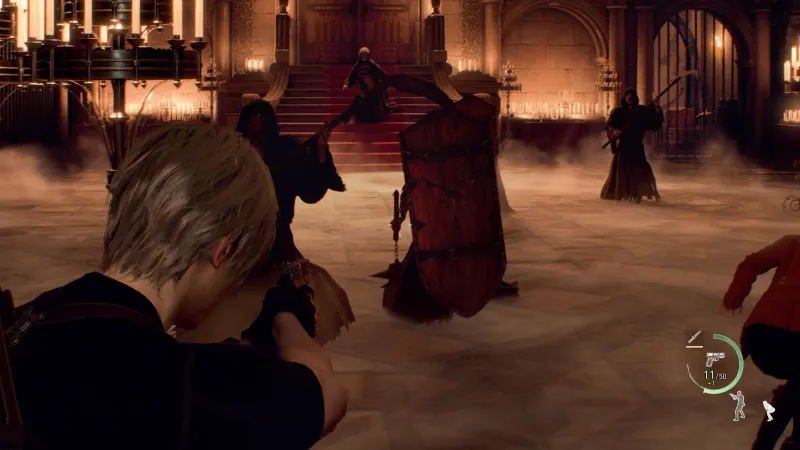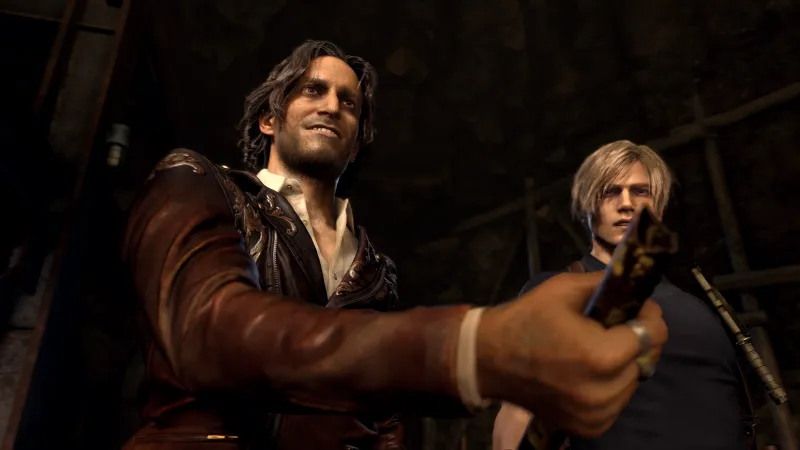There are two entirely different audiences for the Resident Evil 4 remake: those who have played the original game, perhaps multiple or even dozens of times over the last 18 years, and people who have never played it, but want to know what the fuss is all about. Let’s start with the former: unequivocally, if you are a fan of Resident Evil 4, you must play the remake. It’s not only one of the best action games in recent memory; it’s the best Resident Evil since, well, probably the original Resident Evil 4.
From the jump, the remake overwhelms you with danger. The faithfully recreated “village” section throws dozens of enemies your way, requiring you to handle the numerous combat scenarios or die quickly. As it was in 2005, it’s a punch-in-the-face type of opening, the game telling you this is how it will be from here on out; get used to it. Running for my life, terrified of the chainsaw-wielding maniac chasing me through crowds of nasty folks, all the while desperately shooting at enemy kneecaps, parrying incoming projectiles, and running in and out of houses as my scarce ammo count gets closer and closer to zero was tense in a way this level hasn’t been since I was a kid. That the game maintains this tight-gripped action until the credits roll is a feat of game pacing. For the first time since 2005, Resident Evil 4 is scary again, and I couldn’t be happier. It’s incredible.
Gameplay has been expanded – namely, you can walk and aim your gun at the same time now, as well as the aforementioned parrying and new melee options – which makes the already-great bones of RE4 feel modern and fresh. Despite my constant anxiety, I had so much fun that I welcomed every major combat encounter. Especially by the time I unlocked the more powerful weapons – shoutout to my semi-automatic shotgun – blowing through scores of enemies felt fantastic. And don’t get me started on the game’s brutally gross gore system; blasting off heads and arms and even shooting enemies entirely in half as blood flows like confetti out of a pinata has rarely looked this fantastically disgusting. I am a freak, and the Resident Evil 4 remake indulged my sick love of virtual gore.
From a visual and level design perspective, the Resident Evil 4 remake knows precisely when to be nostalgic and when to be fresh. As a lifelong fan of the original, seeing some of my favorite levels and combat arenas recreated 1:1 on the PlayStation 5 was novel and fun. That the next room might be a complete remix or reinvention of a different area, however, kept me on my toes, as if I knew the subject of the painting, but all the details were in new colors. Nevertheless, I welcomed every new addition as much as I did the old standbys.
Perhaps the most elbow grease went into rewriting the game’s story, though the narrative beats are all the same. You play as Leon Kennedy, now a special agent of the United States president sent to a remote Spanish village in search of the president’s missing daughter, Ashley Graham. At that village, all hell breaks loose. You’re soon confronted by scores of angry locals infected by a parasite, Las Plagas, making them easy for the game’s main antagonist to control without completely losing their mental faculties. Leon’s nightmare takes him through the remote village, into the bowels of a baroque castle hoarded over by a ghoulish Napoleon wannabe, and then finally onto the shores of a military stronghold. All the while, monsters, gore, and death follow.

It’s campy, goofy, and over-the-top. And much of that charm is retained here, but with the addition of much sharper writing and better characterization. Ashley, in particular, has been rewritten as a real character with emotions, intelligence, and charisma. That other characters don’t sexually harass her like they did in the original is also a huge improvement. Across the board, the cast has received an overhaul, making the protagonists more likable, the enemies more menacing, and the twisting threads of the plot somewhat more coherent – all the while never losing what made the original story so fun in the first place.
I could write a metaphorical book about all the ways I love the Resident Evil 4 remake, but it might be simplest to tell you to look down at the score at the bottom of this page and sum it up like this: if you loved Resident Evil 4 in the past, you will love this remake. Period. Point blank. It is a love letter to a game that fans know up, down, left, right, and center, a faithful recreation at all the right moments, but with expert refinements and modern sensibilities. It’s also a radical reimagining when it needs to be, a wonderfully fun game fully confident in its ability to remake one of the best games of all time.
What it lacks, however, is context. And that’s important.

Quickly following any mention of the original Resident Evil 4 is discussion of its camera. Rather than the fixed camera angles of its predecessors, the original game placed the camera behind Leon’s back. Most importantly, he was slightly off-center to the left. When he aimed, you looked directly over his right shoulder. This perspective is, of course, the template for almost every third-person video game that came after. Resident Evil 4 changed the shape of the game industry.
As great as this remake is – and let me reiterate, it’s incredible – I do not think it will show you why Resident Evil 4 was so groundbreaking. It just can’t. There’s no universe where this game will ever be as important as the game it remakes. It can’t come out in the same time, space, and context as the first Resident Evil 4. Somewhat ironically, it’s only as good as it is now because it exists in a post-Resident Evil 4 world. And so, while I think it can show you why Resident Evil 4 was fun, goofy, and endearing, if you’re someone interested in just why this old game has such an enduring legacy – especially one strong enough to warrant such a massively expensive remake – your best bet is to still play the original, to try and put your mind in a pre-Resident Evil 4 world to understand how that game could change everything. Or better, you can watch a few minutes of a Let’s Play or read one of the thousands of articles about it. That will make playing the remake a much richer experience; you can see decades of lessons learned throughout the game industry about how to make a third-person action game thrilling, fun, and mechanically effective reapplied to the source material. It’s a refinement, not a reinvention. And that space is the most interesting place this remake can occupy.
The Resident Evil 4 remake is about everything I could’ve wanted. But importantly, it doesn’t overwrite its predecessor. If anything, this new version reinforces why the original Resident Evil 4 is a game people should still seek out, play, or at least watch and learn about. But as a love letter to one of the greatest games of all time, as a new historical artifact that reinforces why the source material was so landmark in the first place, this new trek through the Spanish countryside is as good as it gets and makes a great game that much better.
